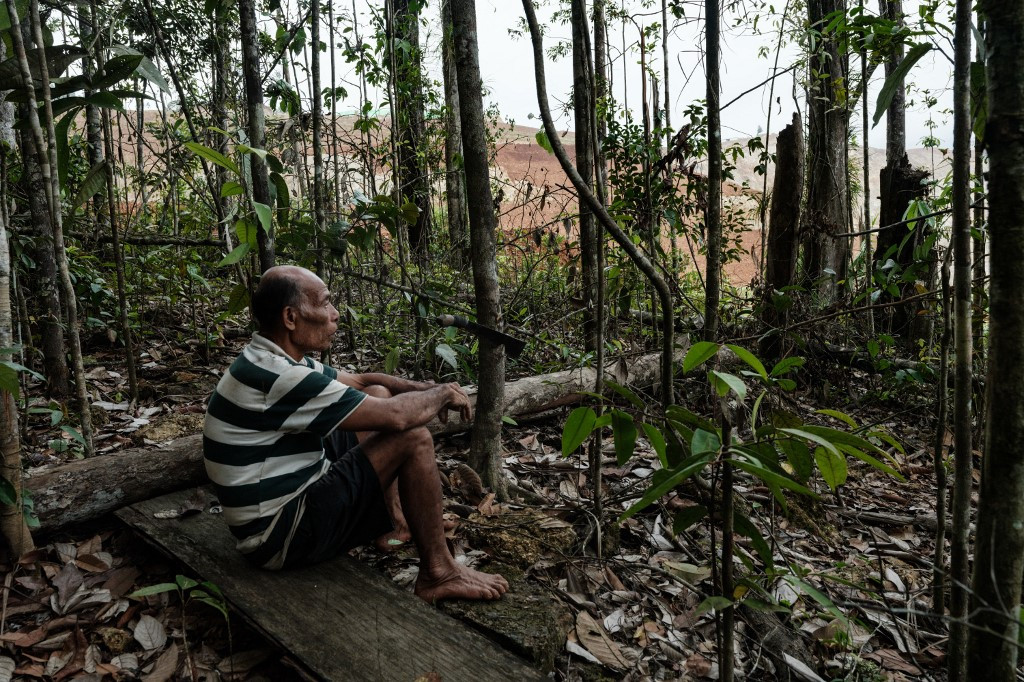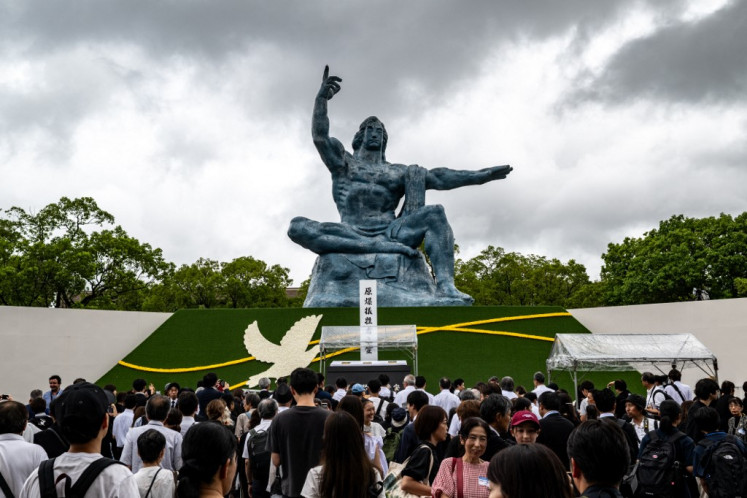Popular Reads
Top Results
Can't find what you're looking for?
View all search resultsPopular Reads
Top Results
Can't find what you're looking for?
View all search resultsMining crisis needs fair laws, local engagement
A new law has been passed to regulate mining and protect the environment and local communities, but its enforcement remains weak.
Change text size
Gift Premium Articles
to Anyone
O
n Buru Island in Maluku, eucalyptus farmer Mahani switched professions and became a gold miner to make more money. He is just one of many who joined a gold rush. In 2011, gold was found on the island’s Mount Botak. Since then, people from around Maluku have been flocking to the island.
Mount Botak reflects the complexity of mining governance in Indonesia. Since gold was discovered in 2011, the area has changed dramatically – from an agricultural region to a hub of unregulated and small-scale mining.
The unbridled use of mercury and cyanide in the mining process has polluted rivers, destroyed ecosystems and is threatening public health.
However, the root of the problem does not lie solely in the behavior of illegal miners. State regulations that should have served as a protective barrier opened up opportunities for exploitation.
When Law No. 4/2009 on mineral and coal mining (Minerba) was revised in 2020, it expanded the authority of the central government and made it easier to grant mining permits.
Article 35 of the law states that mining permits can be granted by the central government without the obligation to consult with local governments or affected communities. This eliminates local control mechanisms and weakens public participation.
Article 136 states that mining permit holders are required to obtain approval from land rights holders. However, there is no detailed explanation regarding the form of approval, verification mechanisms or protection of indigenous peoples’ customary lands. As a result, mining companies can claim to have obtained consent based solely on administrative documents, without a legitimate consultation process.
In the case of Mount Botak, indigenous peoples and local farmers have lost access to productive land. Though the gold mine was closed by the government in 2015, illegal mining activities continued. Law enforcement was ineffective, and criminal sanctions against perpetrators of environmental pollution did not have a deterrent effect. In fact, fines imposed are often not paid, with no clear legal consequences. This demonstrates the weakness of the monitoring system and the inability of regulations to protect public interest.
From an environmental law perspective, the Mining Law is also not in line with the principles of ecological protection stipulated in the country’s Law on Environmental Protection and Management that came into effect in 2009. This law mandates that any activity that has the potential to cause a significant impact on the environment must undergo an Environmental Impact Assessment process. However, in practice, many mining projects are approved without an adequate EIA, or with documents that are merely a formality.
On Mount Botak, the use of mercury and cyanide is uncontrolled. The Waekase and Anahoni rivers, which run through Gunung Botak, are heavily polluted. Research by the National Research and Innovation Agency (BRIN) shows that mercury levels in the Waekase River have reached 0.05 mg/L – 50 times the World Health Organization’s safe threshold.
The environmental law also regulates community participation in decision-making. Article 65 states that everyone has the right to obtain information about the environment, participate in its management, and object to plans for activities that have an impact.
However, in the context of mining, this right is often ignored. The mining licensing process is closed, and the affected communities are not meaningfully involved. When pollution or conflict occurs, access to justice becomes very limited.
Local governments face a dilemma. On one hand, mines generate revenue through taxes and levies. On the other hand, they must bear the social and ecological impacts they cause. Without strong regulatory support, local governments find it difficult to balance economic interests and sustainability. When their authority is curtailed by the Mining Law, their room to maneuver to protect communities and the environment becomes limited.
This situation shows that mines can indeed provide livelihoods, but not without proper regulations. Without regulation, uncontrolled exploitation of natural resources without adequate legal protection will continue.
Several regulatory reforms such as the full recognition of indigenous peoples’ rights to customary lands, with clear and legally binding consent mechanisms, are needed. Regulations must also ensure that customary lands cannot be transferred without a process of consultation and collective consent.
Environmental oversight, including a ban on the use of mercury and cyanide, and the implementation of safe tailings processing technologies is also needed. The government must provide a budget, and resources to monitor the impact of mining on a regular basis.
Strict and consistent law enforcement, with effective criminal and administrative sanctions against polluters and illegal miners, must be ensured. Fines must be paid in full, and the funds should be used for environmental restoration and compensation for affected communities.
A national road map for mining reform, based on scientific data and involving academics, civil society and local communities can ensure that the mining system is fair, transparent and sustainable.
Synchronization between the Mining Law and the environmental law will help integrate the principles of precaution, public participation and ecological restoration and become a part of mining policy.
Without regulatory changes that favor the environment and society, the Mining Law will continue to be a tool for legalizing destruction. Indonesia needs mining policies that not only pursue economic profits but also guarantee ecological and social justice.
Mount Botak is just one of many examples.
In Kalimantan, Sulawesi and Papua, similar stories continue to repeat themselves. If not addressed immediately, environmental damage will continue to spread, and future generations will inherit polluted land and unresolved conflicts.
---
Yanti Lawerissa, D.J.A. Hehanussa and E.R.M. Toule are lecturers on law, and Abraham Tulalessy is a lecturer on agriculture, all at Pattimura University. The article is published under a Creative Commons license.











